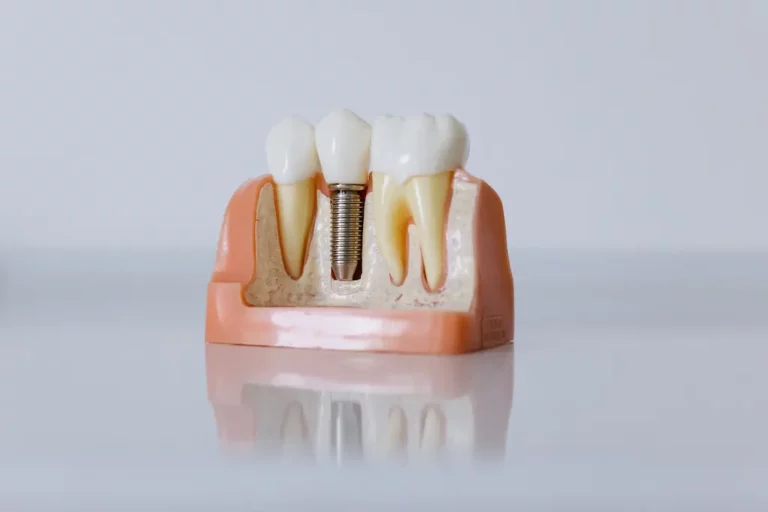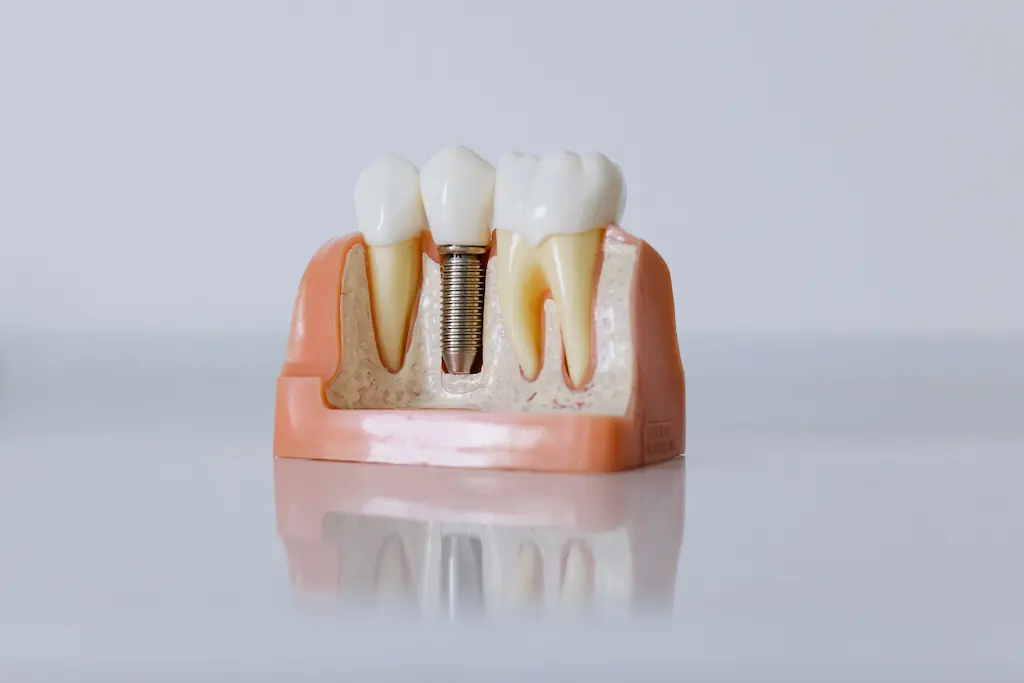Dental implants are replacement tooth roots with metal screw like posts. They are meant to replace damaged or missing teeth. Artificial teeth are used to restore dental implants to mimic the look and function of real teeth. The primary advantage of dental implants is that they provide a stable base upon which to rest new crowns and bridges. This can only happen if the implant’s surrounding bone heals properly. A lengthy therapy may be necessary because of the time it takes for bone repair. On our website, we’ll be discussing dental implant surgery, its cost, and other related topics in the next article. When considering dental implants, it is essential to have a thorough understanding of the procedure. Until then, let’s get to it!
Dental Implant Surgery
During dental implant surgery, damaged or missing teeth are replaced with artificial teeth that look and function similarly to natural teeth. When dentures or bridgework do not fit well or when a lack of natural tooth roots limits the production of dentures or bridgework, dental implant surgery may be a welcome option.
Types of Dental Implants
Dental implants come in three varieties:
Endosteal (in the bone):
Endosteal implants are the most commonly used type of implant. There are several different kinds, some of which include inserting screws, cylinders, or blades into the jawbone.
Subperiosteal (on the bone):
These are positioned above the jawbone, under the gum tissue. When bones are too thin or soft for endosteal implants, or when there is insufficient bone height in the upper jaw, these implants are used.
Transosteal (through the bone):
With this kind of implant, metal bars or frames are surgically positioned under the gum tissue and on top of the jawbone. They extend into the gum to secure the replacement teeth. This kind is utilized when there is sufficient bone in the upper jaw, but insufficient soft tissue covering.
The type of dental implant used will depend on several variables, including
- The health of your jawbone: If the bone has degenerated, a bone graft may be required to strengthen it.
- The placement and size of the tooth gap: The size and form of your replacement tooth will be dictated by the available space.
- Your bite: This must be evaluated to ensure that your new teeth do not compromise the occlusion (bite) of your upper and lower teeth.
- Your gum tissue: The kind of implant used will be determined in part by the thickness and density of your gums.
Why Dental Implant Surgery Done
Dental implant surgery is usually done to:
- Replace a lost tooth or teeth without compromising adjacent teeth.
- Support a dental bridge.
- Support dentures, particularly lower dentures, which are often loose and may make eating difficult.
Procedure for Dental Implants
The following are the stages that are included in the process of getting dental implants:
Assessment:
In order to establish whether or not dental implants are a good option for you, you will meet with your dentist or oral surgeon for a consultation. This will include obtaining x-rays, a CT Scan, and an impression of your teeth and jawbone, in addition to having a conversation about the many treatment choices available to you and what you may anticipate from the process itself.
Bone Grafts:
If your jawbone has become weaker over time, you could need a bone graft in order to restore its strength. In most cases, this is accomplished by utilizing an artificial bone substitute. Before the graft can be used to support an implant, it will need to be allowed to heal for a few months.
Dental Implant and Temporary Crown:
A metal screw-like piece will be placed into the jawbone of the patient during the surgical implant placement . Your gums will be prepared for this by making a little incision in it. The gums will then be sutured and begin to heal growing on top of the implant placement site. Osseointegration occurs during the time that your jawbone is healing and growing around the implant. This takes around three to four months on average on heal.
Permanent Crown Placement:
Once the implant has successfully merged with the jawbone, you will be ready to have the permanent crown placed. The color and contour of your natural teeth will be replicated in the permanent crown when it is crafted. It is then screwed or cemented into position after being positioned on top of the implant. The crown restoration will be connected to the implant through a piece called an abutment.
Caring for Your New Teeth
After the dental implant procedure is over, it is essential for the patient to properly care for their newly implanted teeth. These are the following:
- Checkups at the dentist or oral surgeon should be done on a regular basis.
- Brushing and flossing your teeth on a consistent basis.
- Not smoking.
- Steer clear of items that are tough or require a lot of chewing.
Aftercare Procedures of Dental Implant Surgery:
As mentioned above, regular checkups and following the rules and regulations to avoid any kind of after-surgery pain as much as possible. The are some procedures that you will need to follow as aftercare steps.
- Rest for some days, as you might have a chance of having a fever after the surgery. Take painkillers regularly as prescribed by your dentist.
- Within a few days, your jawbone will be fused, and tissues will be healed. Consult with your dentist after the jaw fusion as they may insert a post or screw into the implant as required. They will also be connecting a replacement crown to those inserted posts.
Cost of Dental Implants
Some of the variables that influence the price of dental implants include:
- The number of implants required.
- The implant kind you pick.
- Whether or not a bone graft is required.
Dental implants are often not covered by dental insurance. Nevertheless, some dental insurance policies may cover a portion of the cost of the crown. Check with your insurance provider for coverage details.
Benefits of Dental Implants
Dental implants provide a number of benefits, including the following:
Improved appearance
Dental implants seem and feel identical to natural teeth. They become permanent because they are engineered to bond with the bone.
Improved speech
With ill-fitting dentures, the teeth might shift inside the mouth, producing slurred speech or mumbling. Dental implants enable you to talk without fear of slipping teeth.
Improved convenience
Implants reduce the pain associated with removable dentures because they fuse with the jawbone.
Easier eating
Dentures that slip might make chewing difficult. Dental implants operate similarly to natural teeth, enabling you to enjoy your favorite meals without fear or discomfort.
Better dental health
Dental implants, unlike bridges, do not depend on nearby teeth for support. More of your natural teeth are preserved, which improves your dental health over time. Individual implants can improve dental hygiene by facilitating access between teeth.
Longevity and durability
Implants are very resilient and may last a lifetime. With proper maintenance, many implants implanted in the 1970s are still functional today.
Risks of Dental Implants
Risks associated with dental implants include:
- Infection at the location of the implant
- Damage to additional teeth
- Nerve injury
- Sinus issues
- Metal allergic responses
How Painful are Dental Implants?
Patients commonly say that dental implants are far less painful than expected. The bulk of postoperative pain is caused by the anesthesia wearing off and may be treated with over-the-counter painkillers. It is also normal for patients to have jaw discomfort for a few days after the treatment, although this may be addressed with pain medication.
Candidates for Dental Implants:
If a patient is already suffering from oral infection, then there is a chance that the infection germs might affect the implant areas, and that will result in a worst-case scenario for the patient.
Hence it is better to give attention to the infection first before proceeding with the implant. Moreover, people with diabetes might have a chance of getting affected due to the implants; hence, it is better to consult with your respective endocrinologist.
Plus, if you are a heavy smoker or drinker, still, you will not be a good candidate for dental implants.
Differences Between Dental Implants and Dentures:
Dental implants are simply prosthetic or fake tooth roots that are surgically implanted into the gum. As a result, the bone surrounding the sum will also help to secure the implants. After that metal teeth are inserted as a replacement for the original teeth.
Dentures are fake teeth that act as support for talking for patients with no or little teeth. It can be inserted into the gum by using dental glue.
Ask your dentist or oral surgeon about all of your choices and what is ideal for you if you’re thinking about getting dental implants. If you have any questions about whether or not dental implants are a good option for you, please don’t hesitate to contact us. Our office is happy to provide a free implant consult for you!
Thank you for taking the time to read this! We really hope that you found this article to be informative and useful. Wishing you all the best for the day!


